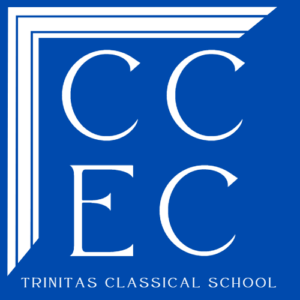 There is a special kind of joy that comes from being part of an educational community rich in beautiful material and interdisciplinary discoveries. I recently had a delightful conversation with a Trinitas teacher about connections between our Thoughtful Reader Book Club author, Mrs. Tellinghuisen’s recent Lenten reflection, and our Virtue of the Quarter. If you are curious how these fit together, read on!
There is a special kind of joy that comes from being part of an educational community rich in beautiful material and interdisciplinary discoveries. I recently had a delightful conversation with a Trinitas teacher about connections between our Thoughtful Reader Book Club author, Mrs. Tellinghuisen’s recent Lenten reflection, and our Virtue of the Quarter. If you are curious how these fit together, read on!
For Thoughtful Reader Book Club this year, we chose two books by George MacDonald (1824-1905)—students read The Princess and the Goblin, and parents and staff are reading Phantastes. MacDonald was a Scottish pastor, poet, and writer of fantasy fiction and a favorite author of many of our favorite authors—Tolkien, Lewis, Chesterton, Carroll, and L’Engle, to name but a few. MacDonald’s vast influence is difficult to overestimate. C.S. Lewis famously said that Phantastes “baptized” his imagination, opening the way for his conversion to Christianity. Of MacDonald’s influence on him as an author, Lewis wrote, “I have never concealed the fact that I regarded him as my master; indeed I fancy I have never written a book in which I did not quote from him.” And speaking for so many other writers, Madeleine L’Engle wrote, “Surely George MacDonald is the grand-father of us all—all of us who struggle to come to terms with truth through imagination.”
The work of MacDonald surely made, and still makes, the world a better and more beautiful place. From our perspective so many years later, it looks like he was blessed to have found his vocation or “calling.” * Theologian Frederick Buechner famously defined vocation as the place where “your deep gladness and the world’s deep hunger meet,” and students around the globe are often encouraged to find their own calling, to find work that coincides with their passions and “changes the world.” We’re not sure MacDonald always experienced his own work this way though.
MacDonald’s passion was poetry, and while his work received good reviews, he struggled to support his young family. His publisher encouraged him to write fiction, and so MacDonald wrote Phantastes, “a kind of fairy tale in the hope that it will pay me better than the more evidently serious work.” * For a significant part of his career, MacDonald put aside his first love, spending time engaged in what he probably felt were less-preferred tasks. What message is there in his example for us?
In her recent Lenten reflection, Mrs. Tellinghuisen encouraged us not to “think big and start small,” as we are so often told to do, but to think small. She encouraged us to turn our gaze during Lent to “the little things on this road that show us the kingdom, in Jesus, has truly come near.” What if we viewed our vocations in this way too? It is certainly a blessing if our work and passions coincide and a further blessing if the result has a wide impact, but we are sometimes called to ignore our “deep gladness” in order to meet not the world’s hunger but the hunger (both figurative and literal) of those near to us. This requires the virtue of self-discipline.
“The Untrue Artist,” a poem by Reid McGrath, begins with the words of Irish playwright George Bernard Shaw (1856-1950):
“The true artist will let his wife starve, his children go barefoot, his mother drudge for his living at seventy, sooner than work at anything but his art.”
In contrast, McGrath paints a picture of the “untrue artist” who with self-discipline responds to the needs of love:
I’ve put untapped potential on a shelf
much like a book one someday wants to read.
I’m less concerned with cultivating “Self;”
and now am more concerned with what we need.
We’re married. You’re more beautiful than books.
The Muse is not my mistress anymore.
Despite how mainstream or mundane he looks,
the Pragmatist is no one to abhor.
If I can make it to retirement,
I’ll pen the poems you deserve to hear.
But if the artist in his art is pent,
I’ll eschew those poor penthouses, my dear.
I hope you know that when I stoke the stove,
get out the door, then labor out of sight,
I show my love—not with poems of love,
but with books of poems I won’t write.
MacDonald considered poetry the highest form of literary art. Phatastes was written by an “untrue artist,” one who was willing to show his love to his family for a time with the poems he didn’t write. This other-focused nature of the virtue of self-discipline is captured well in MacDonald’s dictum, “bethink thee of something thou oughtest to do, and go and do it, if it be but the sweeping of a room or the preparing of a meal or a visit to a friend. Heed not thy feelings. Do thy work.” Self-discipline is very often a matter of being faithful in little things, of performing small and consistent, sometimes less-preferred, acts of service and love for others. During this season of Lent and beyond, let us remember that it is often not in “changing the world” but in being faithful that we live according to our calling as followers of Christ.
*Greville MacDonald, George MacDonald and His Wife (George Allen and Unwin, 1924), 288.
**“Vocation” comes from Latin, vocare, “to call.”
© ALP





